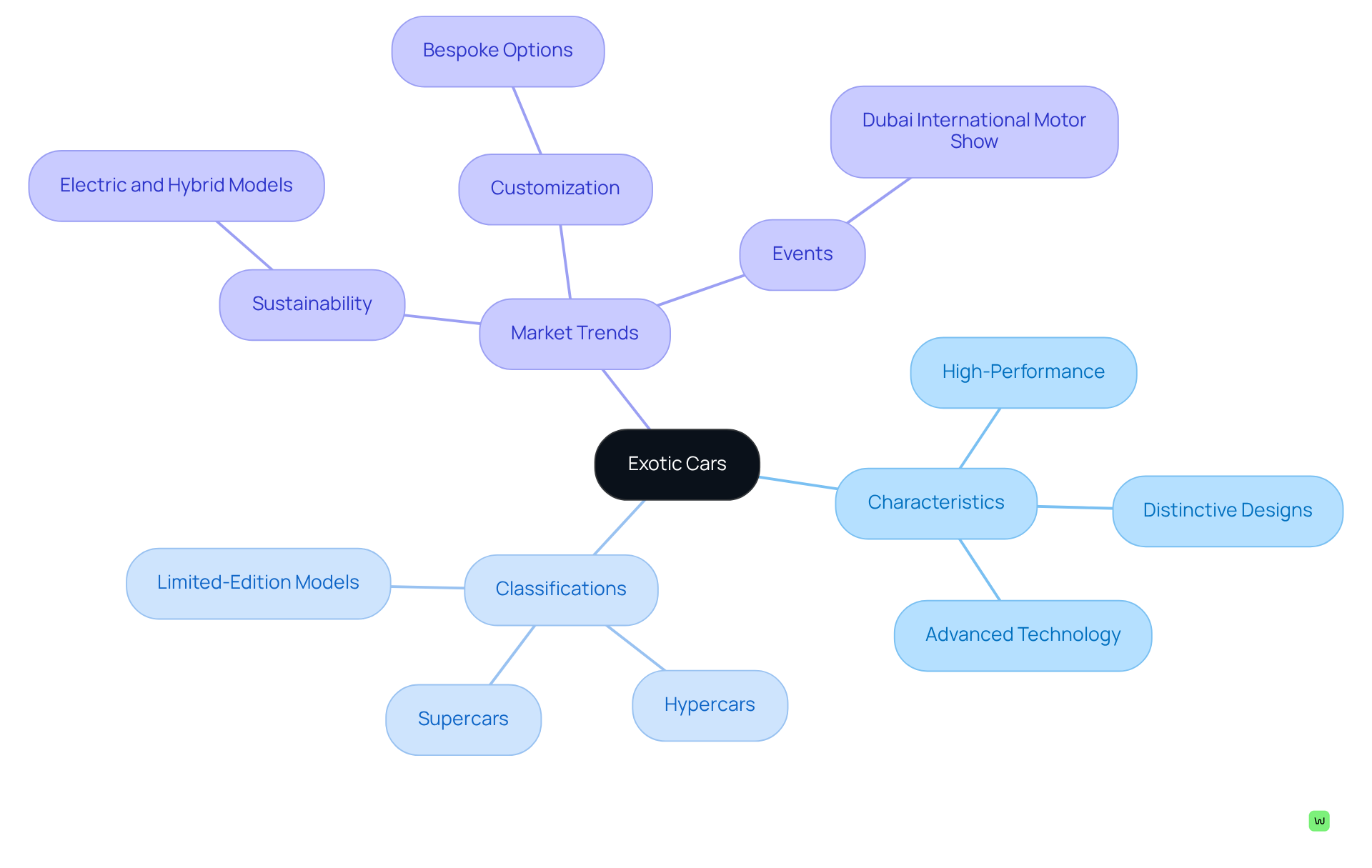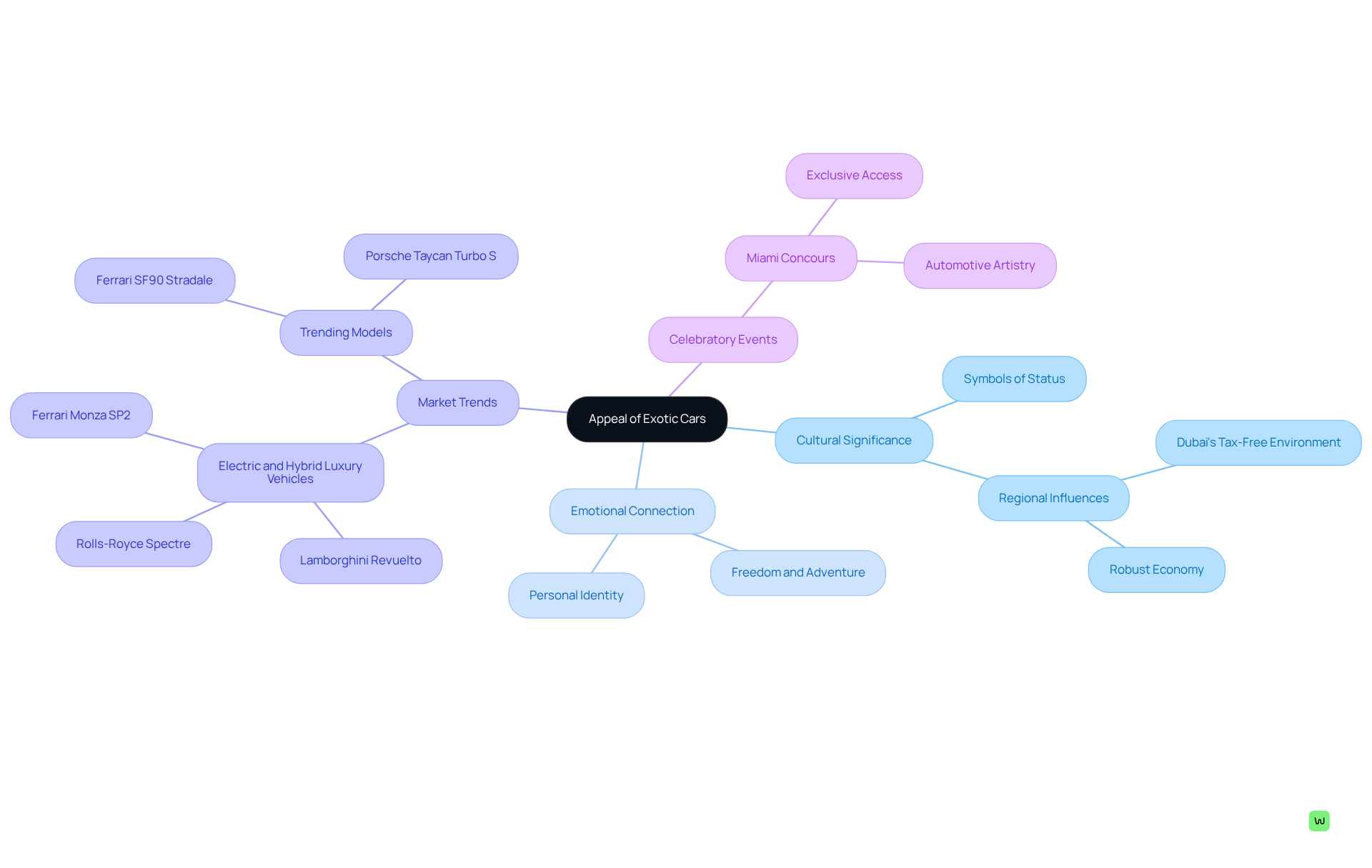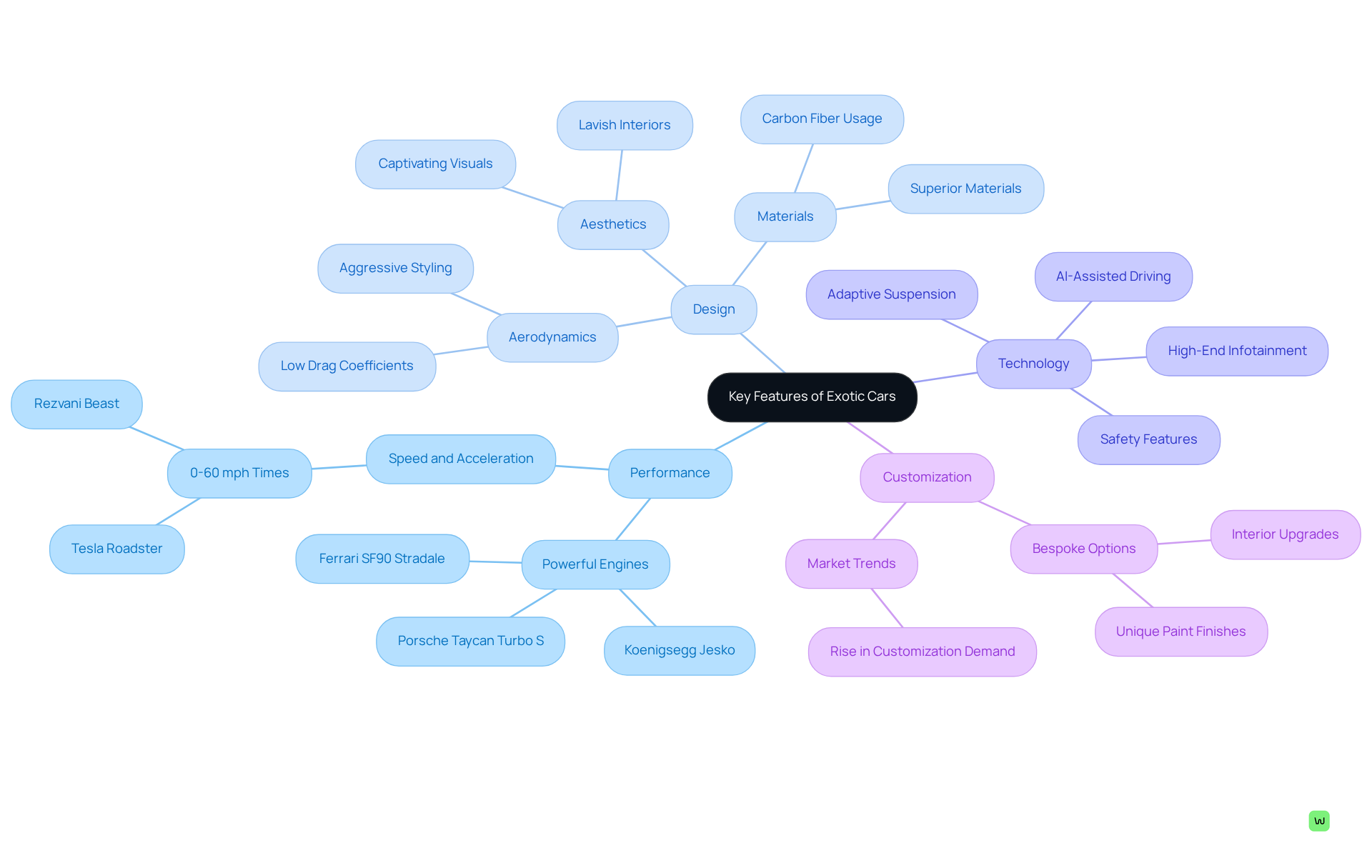Overview
Exotic cars are high-performance, opulent vehicles produced in limited quantities, emphasizing speed, agility, and advanced technology. This distinctiveness sets them apart from standard luxury cars. Have you ever considered how these remarkable machines have evolved? From early 20th-century models to modern hybrids, their journey is fascinating. Key features include:
- Powerful engines
- Striking design
- Cutting-edge technology
These elements collectively enhance their appeal as symbols of status and innovation in the automotive world. As you explore the evolution of exotic cars, consider how they embody the pinnacle of automotive excellence.
Introduction
Exotic cars epitomize the pinnacle of automotive engineering, merging rarity, luxury, and unmatched performance in a manner that captivates both enthusiasts and collectors. These high-performance vehicles not only showcase cutting-edge technology and breathtaking designs but also embody a cultural significance that extends beyond mere transportation.
As the market evolves, the allure of exotic cars prompts compelling inquiries:
- What precisely defines an exotic car in today's landscape?
- How do these extraordinary machines mirror the changing desires of consumers?
Define Exotic Cars: Characteristics and Classifications
Exotic cars are defined as high-performance machines that are not only uncommon but also opulent, often produced in limited quantities. These exotic cars are known for their distinctive designs, cutting-edge engineering, and exceptional performance capabilities. Unlike standard high-end vehicles that prioritize comfort and sophistication, exotic cars emphasize speed, agility, and advanced technology. Common classifications of exotic cars include:
- Supercars
- Hypercars
- Limited-edition models
Each represents a unique tier of performance and exclusivity. For instance, the Ferrari LaFerrari and the Bugatti Chiron exemplify the pinnacle of luxury car engineering, merging breathtaking aesthetics with unparalleled performance.
In 2025, the premium car market is witnessing a significant shift towards sustainability. An increasing percentage of high-end car buyers are considering exotic cars that incorporate electric and hybrid technologies. The Porsche Taycan Turbo S, for example, boasts a twin-turbocharged 3.7-litre flat-six engine producing 640hp, accelerating from 0-62mph in just 2.7 seconds. This showcases its high-performance capabilities while embracing eco-conscious engineering. Similarly, the Ferrari SF90 Stradale, with its hybrid technology, represents a fusion of power and sustainability, appealing to buyers of exotic cars in the modern luxury market.
Moreover, the demand for customization is rising as buyers seek bespoke options that enhance the uniqueness of their vehicles. This trend is particularly evident in the growing fascination with classic and vintage models among collectors in Dubai, highlighting the evolving allure of luxury cars.
Events like the Dubai International Motor Show further solidify the city's status as a high-end car destination. These events showcase the latest innovations and trends in the premium car market, often featuring the unveiling of limited-edition models and advancements in automotive technology. As the market evolves, the categories of unique vehicles continue to adjust, emphasizing technological progress and exclusive options that attract discerning purchasers.

Explore the Appeal of Exotic Cars: Cultural and Emotional Significance
The allure of exotic cars extends far beyond mere engineering prowess; they are often regarded as symbols of affluence, influence, and status. In many cultures, particularly in Dubai, owning exotic cars signifies not only financial success but also a luxurious and exclusive lifestyle. This is bolstered by the region's tax-free environment and robust economy.
Moreover, the emotional connection to exotic cars is heightened by their portrayal in popular culture, where they frequently appear in films, music videos, and social media, solidifying their status as coveted possessions. In 2025, limited-edition models like the Lamborghini Revuelto and Rolls-Royce Spectre are trending, showcasing the shifting preferences of consumers who increasingly favor electric and hybrid luxury vehicles.
For many enthusiasts, driving exotic cars transcends mere transportation; it embodies freedom, adventure, and personal identity. This deeply fulfilling experience is further celebrated at events such as the Miami Concours, which highlight the creativity and ingenuity of these automobiles, amplifying their cultural significance.
Are you ready to explore the world of unique vehicles? Discover how these machines not only enhance status but also reflect evolving consumer desires.

Trace the Evolution of Exotic Cars: From Concept to Icon
The evolution of exotic cars started in the early 20th century, marked by pioneering manufacturers who pushed the boundaries of performance and design. Iconic models such as the Bugatti Type 35 and the Mercedes-Benz 300SL laid the groundwork for the supercar phenomenon. The 1960s and 1970s heralded a golden age with legendary vehicles like the Lamborghini Miura and the Ferrari 250 GTO, which not only redefined speed but also set new standards for aesthetics and engineering excellence.
As technology progressed, the 1990s introduced the McLaren F1, a revolutionary model that seamlessly blended blistering speed with unparalleled luxury. Today, the environment of unique vehicles continues to evolve, with a strong focus on hybrid technology and advanced aerodynamics. This ongoing evolution reflects a commitment to innovation, ensuring that exotic cars remain at the forefront of automotive excellence.
What does this mean for the future of the market for exotic cars? The relentless pursuit of performance and design excellence promises to push boundaries further than ever before. Are you ready to embrace the next chapter in automotive history?
![]()
Identify Key Features of Exotic Cars: Performance, Design, and Technology
Exotic cars captivate enthusiasts and collectors alike, distinguished by several key characteristics that significantly enhance their allure. Performance stands at the forefront; many models boast powerful engines that deliver remarkable speed and acceleration. Take the Koenigsegg Jesko, for instance, featuring a twin-turbo V8 engine capable of producing over 1,600 horsepower. This showcases the extreme capabilities these vehicles possess.
Equally essential is design. High-performance vehicles often exhibit aerodynamic forms, captivating aesthetics, and lavish interiors crafted from superior materials, enhancing their visual appeal. Insights from automotive engineers reveal that design elements such as low drag coefficients and aggressive styling not only boost performance but also draw attention on the road.
Moreover, technology plays a pivotal role in contemporary luxury vehicles. Innovations such as adaptive suspension systems, high-end infotainment, and state-of-the-art safety features have become standard in the industry. As we approach 2025, sustainability is increasingly shaping consumer choices, leading to a rise in the popularity of electric and hybrid luxury automobiles, including the Ferrari SF90 Stradale and Porsche Taycan Turbo S. The growing infrastructure for electric transportation in Dubai further bolsters this trend, enhancing the accessibility of these models.
Customization is another significant market aspect, with buyers actively seeking bespoke options that reflect their personal style. These elements converge to create vehicles that are not only visually stunning but also engineered for peak performance. As of July 2025, the latest performance statistics indicate that many exotic cars are reaching unprecedented levels of speed and handling, which solidifies their status in the luxury automotive market. Are you ready to explore the world of exotic cars and experience the thrill they offer?

Conclusion
Exotic cars epitomize automotive excellence, characterized by their unmatched performance, distinctive designs, and advanced technology. These high-performance vehicles are not merely symbols of status and wealth; they embody the evolving aspirations of luxury car enthusiasts. The exotic car landscape is transforming, integrating sustainability while preserving the exhilarating experience that enchants both collectors and drivers.
This article has delved into the multifaceted nature of exotic cars, examining classifications such as supercars and hypercars, alongside their cultural significance in places like Dubai. The evolution of these extraordinary machines reveals a rich history of innovation, with iconic models leading the charge for future advancements. Features such as powerful engines, aerodynamic designs, and bespoke customization options enhance their appeal, establishing them as coveted possessions that transcend basic transportation.
As the exotic car market evolves, embracing electric and hybrid technologies, the call to action is clear: explore the realm of exotic vehicles and recognize how they reflect not only personal identity but also broader cultural trends. The journey of exotic cars is far from complete, and their future promises to be as thrilling as their past. Embrace the excitement and discover what makes these remarkable machines truly exceptional.
Frequently Asked Questions
What defines exotic cars?
Exotic cars are high-performance vehicles that are uncommon, opulent, and often produced in limited quantities. They are characterized by distinctive designs, cutting-edge engineering, and exceptional performance capabilities, focusing on speed, agility, and advanced technology rather than just comfort.
What are the common classifications of exotic cars?
The common classifications of exotic cars include supercars, hypercars, and limited-edition models, each representing a unique tier of performance and exclusivity.
Can you provide examples of exotic cars?
Examples of exotic cars include the Ferrari LaFerrari and the Bugatti Chiron, which exemplify luxury car engineering with breathtaking aesthetics and unparalleled performance.
How is the exotic car market changing in 2025?
In 2025, the premium car market is shifting towards sustainability, with more high-end car buyers considering exotic cars that incorporate electric and hybrid technologies.
What are some examples of sustainable exotic cars?
The Porsche Taycan Turbo S, which features a twin-turbocharged 3.7-litre flat-six engine producing 640hp and accelerates from 0-62mph in just 2.7 seconds, and the Ferrari SF90 Stradale, which uses hybrid technology, are examples of sustainable exotic cars.
What trends are emerging in the exotic car market?
There is a rising demand for customization, with buyers seeking bespoke options to enhance the uniqueness of their vehicles. Additionally, there is a growing fascination with classic and vintage models among collectors, particularly in Dubai.
What role do events like the Dubai International Motor Show play in the exotic car market?
Events like the Dubai International Motor Show showcase the latest innovations and trends in the premium car market, featuring the unveiling of limited-edition models and advancements in automotive technology, reinforcing Dubai's status as a high-end car destination.




